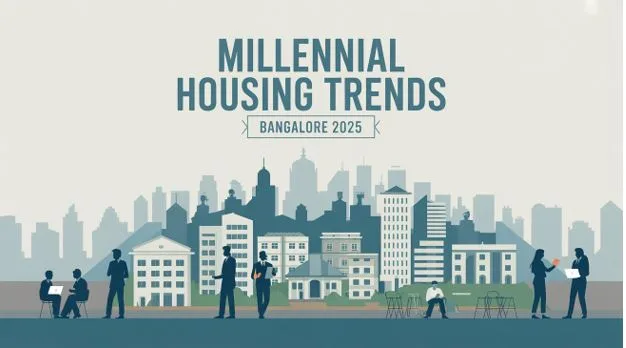Best Residential Areas in Bangalore for Millennials | Lifestyle & Career Growth
India’s Silicon Valley has emerged as the preferred destination for the country’s 440 million millennials, with recent housing surveys revealing a dramatic shift in residential preferences among young professionals. Bangalore, home to 12.35 million residents and growing at 2.76% annually, now attracts the highest concentration of millennials seeking to balance career growth with lifestyle amenities.
According to Knight Frank India’s latest millennial housing survey, 70% of millennials now prefer homeownership over renting—a complete reversal from 2016 trends. This demographic shift, combined with 44% of Indians planning residential relocation within two years compared to 31% globally, positions Bangalore’s residential areas in Bangalore as critical decision points for career-focused young professionals.
The city’s 4.5 million IT professionals, including 1.5 million direct employees, have created distinct residential clusters that cater to millennial preferences for connectivity, lifestyle amenities, and career advancement opportunities.
Why Millennials Prefer Bangalore as a Residential Hub
Bangalore’s appeal to millennials extends beyond its established reputation as India’s technology capital. The city offers a unique combination of favorable climate, cosmopolitan culture, and career opportunities that align with millennial priorities identified in recent demographic studies.
Climate and Quality of Life Advantages
Unlike India’s other major metropolitan centers, Bangalore maintains moderate temperatures year-round, with average highs ranging from 24°C to 29°C. This climate advantage reduces lifestyle stress factors that millennials increasingly prioritize, particularly those relocating from extreme weather regions.
Economic Opportunity Concentration
The city hosts over 13,000 registered startups alongside established global technology giants including Amazon, Google, Microsoft, and Meta. This concentration creates diverse career pathways and networking opportunities essential for millennial professional development.
Cultural Integration and Global Connectivity
Bangalore’s international professional community, estimated at over 200,000 expatriates and global assignees, creates a culturally integrated environment that appeals to millennials seeking diverse social and professional networks.
Infrastructure Development Timeline
The recent launch of Metro Yellow Line in August 2025, expanding the network to 96 kilometers, significantly improves connectivity across key residential and employment districts. Phase 3 expansion plans through 2030 will further enhance accessibility to emerging residential areas.
Key Factors Millennials Consider When Choosing Residential Areas
Research data reveals that 69% of millennials prioritize location factors over cost considerations, with workplace proximity ranking as the top priority for 9% of respondents. This preference structure influences residential choices across Bangalore’s diverse locality options.
Technology Integration Requirements
Millennial housing preferences emphasize smart home capabilities, high-speed internet infrastructure, and app-controlled amenities. These requirements have driven development standards in newer residential projects and retrofit initiatives in established areas.
Community-Centric Amenities
Survey data indicates strong preference for co-working spaces, social interaction zones, and shared amenities within residential complexes. This trend reflects millennial values around community building and work-life integration.
Commute Optimization Priority
With Bangalore’s traffic challenges, millennials increasingly favor residential areas in bangalore that minimize commute times to major employment hubs. Metro connectivity and proximity to IT corridors strongly influence residential decisions.
Top Residential Areas in Bangalore for Millennials
Based on demographic concentration, lifestyle amenities, and career growth opportunities, eight localities emerge as top localities in Bangalore for young professionals.
Whitefield – Established IT Corridor
Whitefield remains the premier choice among Bangalore localities near IT hubs, hosting major technology parks including ITPL, EPIP, and GR Tech Park. The area’s Metro connectivity via Blue Line provides direct access to central Bangalore, while established infrastructure supports both rental and homeownership preferences.
Millennial Demographics: 65% of residents aged 25-40, predominantly IT professionals Connectivity Advantages: 45-minute metro commute to MG Road, direct airport access Lifestyle Infrastructure: International cuisine options, shopping malls, recreational facilities Housing Market: Rental ranges ₹15,000-35,000 for 2-3 BHK units
Koramangala – Startup Ecosystem Hub
Recognized as Bangalore’s startup capital, Koramangala attracts millennials seeking entrepreneurial opportunities and vibrant nightlife. The locality hosts numerous incubators, co-working spaces, and venture capital offices, creating dense professional networking opportunities.
- Professional Ecosystem: Over 2,000 startups and technology companies
- Social Infrastructure: Highest concentration of cafes, bars, and entertainment venues
- Housing Characteristics: Mix of independent houses and modern apartments
- Millennial Appeal: 24/7 lifestyle options, walking distance to business districts
Indiranagar – Cultural and Professional Balance
Indiranagar combines upscale residential options with cultural attractions, appealing to millennials seeking sophisticated lifestyle amenities. The area’s mature infrastructure and diverse dining scene attract senior professionals and international assignees.
- Cultural Advantages: Art galleries, theaters, fine dining establishments
- Professional Demographics: Senior IT executives, consulting professionals, creative industries
- Connectivity: Central location with multiple transport options
- Housing Premium: Higher rental costs justified by lifestyle amenities
HSR Layout – Planned Development Excellence
HSR Layout represents modern urban planning principles, attracting millennials who prioritize organized infrastructure and contemporary amenities. The area’s systematic development includes dedicated commercial zones, recreational facilities, and green spaces.
- Planning Advantages: Grid-based road network, designated parking, modern utilities
- Demographic Profile: Young families and working professionals
- Amenities Density: Shopping complexes, hospitals, educational institutions within walking distance
- Future Growth: Ongoing infrastructure development and connectivity improvements
Electronic City – Value Proposition with Metro Access
Electronic City offers the best places to live in Bangalore for working professionals seeking affordability without compromising career opportunities. The recent Metro Yellow Line extension significantly improves connectivity to central business districts.
- Cost Advantage: 30-40% lower housing costs compared to northern localities
- Employment Proximity: Major IT campuses including Infosys, Wipro, and HCL
- Infrastructure Development: New metro connectivity reducing commute times
- Growth Potential: Emerging retail and lifestyle amenities
Marathahalli – IT Professional Concentration
Marathahalli’s proximity to major IT corridors and affordable housing options make it popular among entry-level and mid-career professionals. The area provides practical residential solutions for millennials prioritizing career growth over lifestyle amenities.
- Professional Density: High concentration of IT employees and young professionals
- Affordability Factor: Competitive rental rates and purchase options
- Connectivity Benefits: Ring road access, proximity to multiple IT hubs
- Community Development: Growing retail and dining options
Sarjapur Road – Emerging Lifestyle Destination
Sarjapur Road represents millennial-friendly neighborhoods in Bangalore with modern residential projects and developing lifestyle infrastructure. The corridor’s strategic location between established IT hubs creates strong growth potential.
- Development Timeline: Rapid infrastructure and residential development since 2020
- Lifestyle Evolution: Emerging restaurant, cafe, and entertainment options
- Professional Appeal: Proximity to multiple IT parks and business districts
- Investment Potential: Appreciation prospects due to ongoing development
Hebbal – Lake District Premium
Hebbal combines natural amenities with urban infrastructure, attracting millennials seeking Bangalore residential areas with lifestyle amenities. The area’s lake proximity and green spaces provide recreational options while maintaining connectivity to business districts.
- Natural Advantages: Lake views, green spaces, relatively lower pollution levels
- Infrastructure Maturity: Established schools, hospitals, shopping centers
- Professional Proximity: Access to Manyata Tech Park and northern IT corridors
- Premium Positioning: Higher-end residential options with lifestyle focus
Lifestyle and Career Growth Opportunities by Area
The relationship between residential location and career advancement varies significantly across Bangalore’s millennial-preferred localities. Research indicates that proximity to professional networks, industry events, and mentorship opportunities influences long-term career trajectories.
Networking Density Analysis
Koramangala and Indiranagar lead in professional networking opportunities, hosting regular industry meetups, startup events, and investor presentations. These localities facilitate organic professional relationship building essential for career advancement.
Skill Development Access
Areas near established IT corridors provide greater access to training centers, certification programs, and continuing education opportunities. Whitefield and Electronic City offer proximity to corporate training facilities and professional development resources.
Work-Life Integration Benefits
Localities with mixed-use development, including HSR Layout and emerging Sarjapur Road areas, enable better work-life integration through reduced commute times and proximate amenities. This integration increasingly influences millennial residential decisions.
Future Outlook: Emerging Areas for Millennial Investment
Metro Phase 3 expansion and planned infrastructure developments will create new residential opportunities for millennials through 2030. Areas currently under development present early investment opportunities for forward-thinking young professionals.
North Bangalore Transformation
The Devanahalli corridor, driven by airport proximity and dedicated infrastructure investments, represents significant growth potential. Current affordability levels provide entry opportunities before major appreciation cycles.
Peripheral Ring Road Impact
Planned ring road completion will enhance connectivity to currently peripheral areas, creating new residential options that balance affordability with accessibility to employment centers.
Smart City Initiative Integration
Bangalore’s smart city developments will prioritize technology integration in residential planning, aligning with millennial preferences for connected living environments.
The convergence of demographic trends, infrastructure development, and evolving work patterns positions Bangalore’s affordable housing in Bangalore for Millennials as a critical component of India’s urbanization story. Millennials seeking best areas in Bangalore for nightlife & connectivity will find expanding options as the city’s residential landscape evolves to meet their professional and lifestyle requirements.
As India’s millennial population continues driving residential demand, Bangalore’s diverse locality options provide strategic choices for career-focused young professionals balancing immediate lifestyle needs with long-term investment potential.






